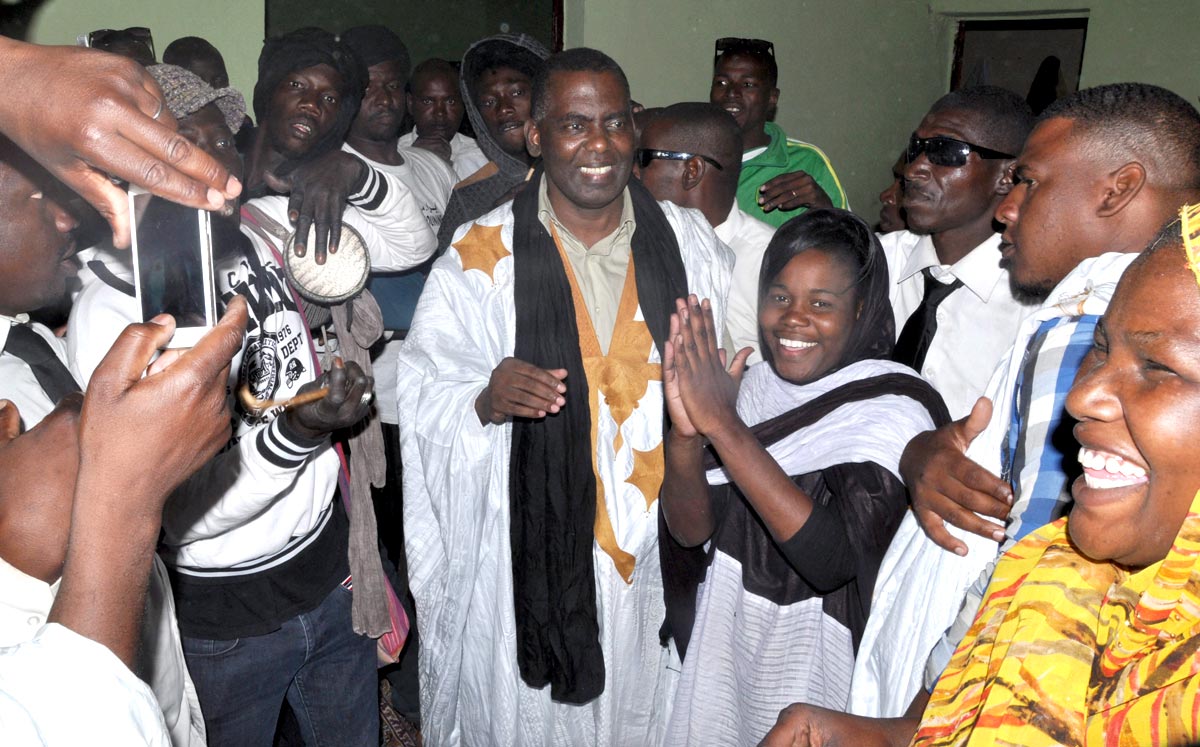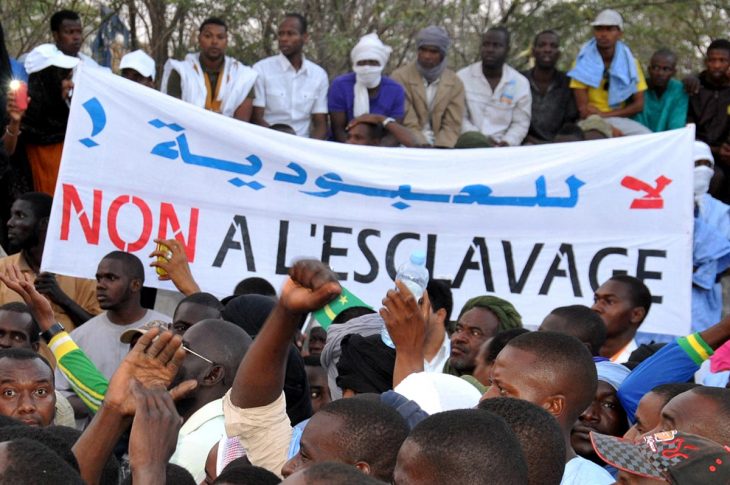The phenomenon of slavery in Mauritania "persists in a mental, ideological, religious and customary way in all the ethnic groups that make up the Mauritanian people," Biram Dah Abeid told Justice Info. This opposition MP and two-time unsuccessful presidential candidate is one of the best-known anti-slavery activists in Mauritania. Arabs and Berbers "still practice hardcore slavery", says this descendant of a slave, who chairs the Initiative for the Resurgence of the Abolitionist Movement (IRA).
According to the Global Slavery Index published by the Walk Free Foundation, 90,000 people were living in "modern slavery" in Mauritania in 2018, or 2.4 percent of the population, while 62 percent were "vulnerable" to this type of slavery. Local associations accuse the government of not allowing a census of slaves and say these figures are far from reflecting the full extent of the phenomenon.
"Children risk being sold”
The Haratine community is the most enslaved. Haratines are "domestic slaves by descent, so they are attached to the family of their masters, for whom they worked continuously without pay and suffer corporal punishment," explains Dah Abeid. The fate of female slaves is the hardest. "Women and girls are raped from the time they are young by the master, the master's son, the master's cousin or neighbour, or a passing stranger; they are also objects of sexual apprenticeship for the children of the overlords," says the activist. "The children of these slave women, whose biological fathers are rarely identified, are likely to be rented out, pledged, sold or given by the mother’s owner to whomever he wishes. According to the so-called 'religious law' that codifies slavery, slave status is transmitted through the mother's line."
Arabs and Berbers, where a family can own up to 50 slaves, consider themselves "white and noble, while black is synonymous with slave", he says. Because of their long history, these black-skinned Haratines speak Hassania (Mauritanian Arabic), the language of their white masters.
Alongside the Haratines and their masters, there are those known as Negro-Mauritanians or Afro-Mauritanians. They are Wolof, Soninke, or Fulani, and their mother tongues are African languages rather than Arabic. Among them, slaves and masters are all black. But here too, slaves are subjected to "inhuman and degrading treatment and abuse," says Dah Abeid.
The headache of civil status
According to El Kory Sneiba, communications officer at the Mauritanian NGO SOS Esclaves, even if they manage to escape from the clutches of their masters, former slaves still face a host of difficulties related to civil status. "It is a real headache for them," the activist told Justice Info as his association prepared to hold an awareness-raising day on this subject in Nouakchott on August 16. "This is a very urgent issue. The conditions for access to civil status are practically impossible for slaves. It’s a serious problem that can threaten social cohesion and there is a chilling imbalance. Hundreds of thousands of people are unable to register. If someone is not registered, he or she does not exist as a citizen, and cannot access any rights, including education," El Kory Sneiba told the local newspaper Cridem at the close of the conference.
"Window dressing”
Slavery has been officially abolished in Mauritania since 1981, and a September 2007 law provided for a penalty of five to ten years' imprisonment for slaveholders. The same law punishes public officials and judges who fail to assist slaves, as well as complicity in slavery and its glorification.
In August 2015, a new law was passed. It qualifies slavery as a crime against humanity and increases jail sentences to between 10 and 20 years. The new text creates specialized jurisdictions. It allows, in theory, compensation for victims and grants "recognized" NGOs the right to denounce cases of slavery, to assist victims in court and act as civil parties.
"These legislative advances are just window dressing," says activist El Kory Sneiba, who thinks the specialized chambers "do not do their job, or do it badly”. "These laws are there to please the international community. There is no real political will to abolish slavery. Mauritania is one of the last bastions of the dehumanization of human beings," adds Fatimata Mbaye, president of the Mauritanian Association for Human Rights (AMDH). Mbaye, the first female lawyer in her country, defended Dah Abeid when his anti-slavery activities landed him in prison.
This analysis is shared by their Western partners, including Jean-Marc Pelenc, president of IRA-France. "These laws were passed under international pressure and are not being applied at all,” he says. “They are only there to provide Mauritania with some diplomatic cover on this issue.”

Complicity of the élite
Over the past 15 years, several complaints have been filed for crimes of enslavement. "But instead of using the law to pursue those who committed the crimes, very often the Mauritanian authorities go after the complainants, the victims and the anti-slavery activists, in order to arrest them, torture them, demonize them and sentence them," says Dah Abeid.
"In the rare cases where the state agrees to take up a slavery case, it is only to distort the facts and absolve the criminals,” he adds. “There is clear group complicity between the judges, judicial police officers and the criminals, because they all come from the same aristocratic groups that dominate the country."
In a joint report to the UN Human Rights Council in February 2021, the Association of Women Family Leaders (AFCF), SOS Esclaves, Anti-slavery International (ASI), International Service for Human Rights (ISHR) and Minority Rights Group International (MRGI) wrote: "Several slavery cases brought to the attention of the authorities have been reclassified as labour disputes, exploitation of minors, or have been resolved through out-of-court settlements. This technique of reclassification has resulted in denying the criminal significance of these cases and discouraging legal action by victims. In the few cases where slavery claims are successful, procedures and deadlines are rarely followed. The unexplained delays in proceedings underscore an unwillingness to expose slave masters to criminal liability.
Victims encouraged to withdraw complaints
In its 2021 Trafficking in Persons Report, the US State Department reports that during 2020, “some police, prosecutors, and investigative judges reportedly refused to investigate and try cases of hereditary slavery or to acknowledge that hereditary slavery continued to occur”. According to the report, some prosecutors encouraged victims to withdraw their complaints in exchange for modest financial compensation. One of the three specialized chambers -- in Nouadhibou -- sentenced three slave traders to 20 years in prison and acquitted a fourth for lack of evidence. Of the three that were sentenced, only one is in jail; the other two were tried in absentia. These were "unrealistic" judgments, according to Dah Abeid, who says that in other trials, sentences had been handed down to dead people.
For the first time in late 2017, the African Union deemed the Mauritanian government to be in violation of its obligation to protect children from slavery. This was in response to a complaint filed to its Committee of Experts on the Rights and Welfare of the Child (CAEDBE) by SOS Esclaves, on behalf of two young brothers who were victims of slavery, Sais Ould Salem and Yarg Ould Salem. However, "even if the authorities have implemented some of the recommendations made by the Committee regarding the two brothers, such as social and educational care and the delivery of identity documents, most of the recommendations regarding the care and liberation of all children in slavery have gone unheeded," said SOS Esclaves and its international partner organizations.
Lip service to indignation
On January 29 before the UN Human Rights Council, Commissioner for Human Rights and Humanitarian Action Mohamed El Hassen Boukhreiss, who led the Mauritanian delegation, tried to brush aside the criticism. According to the delegate, "the capacity of the courts specialized in the fight against slavery practices has been strengthened by a significant increase in financial allocations and human resource support”. He said judicial activity in this area had intensified and courts had begun to adjudicate pending cases and render judicial decisions involving sentences ranging from one year to 20 years in jail with reparations for the victims.
During the discussions, some delegations expressed indignation at the persistence of slavery practices. For example, the United Kingdom recommended that Nouakchott "redouble its efforts to end all forms of slavery and discrimination, particularly those based on caste or ethnicity”. In the same vein, the US "urged Mauritania to intensify efforts to investigate, prosecute, and sentence slaveholders to appropriate prison terms.
State slavery
But activists want a tougher stance against Nouakchott. “Slavery is organised in Mauritania,” says Pelenc. “It is actually State slavery, State racism. Everyone is concerned, the diplomatic corps is informed, many books have been published on the subject but there is no action, no one has the courage to bang on the table."
Judith Abitan, Executive Director of the Raoul Wallenberg Centre for Human Rights, agrees. "This reality can be likened to an unwritten apartheid that results in the systematic economic exclusion of the black community and the continuation of ancestral slavery practices.” Based in Canada, the Centre is involved in the defence of Mauritanian anti-slavery activists.
Stronger pressure is needed so that "the Mauritanian state makes a clear declaration of its will to truly abolish slavery", agrees Sneiba of SOS Esclaves. "It is only then that judges, police and gendarmerie will deal with slavery cases in accordance with existing laws, without reclassifying them as child labour or forced labour." He says what is needed is not only "rigorous application of the laws" but also "a policy of taking care of former slaves”.






